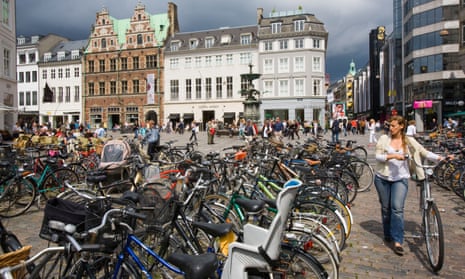The chancellor is a busy man. The day before the results of his Comprehensive Spending Review, I doubt he is giving too much thought to cycling but if he did he would see the real opportunity it offers to boost the economy and lighten the load on the public purse.
I am a cyclist but I am also a motorist. My family runs two cars and I drive about 25,000 miles every year. I’m not a fanatical advocate, I’m a realist who champions the cause of the bicycle because I believe in evidence. In fact the issue here is not about cyclists or cycling at all: it is about transport, health, pollution and the economy.
The government’s own figures show that physical inactivity costs Britain £47bn a year – nearly £1bn a week – and has been described by NHS England CEO Simon Stevens as a “slow motion car crash” for the service. Air pollution in our cities was responsible for more than 29,000 deaths in the UK last year. Businesses lose £1.5bn to congestion in the capital. The poorest in our society don’t have access to cars and many struggle to afford public transport.
Cycling alone cannot solve all of these problems, but it can make a significant contribution in a way that offers outstanding value for money.
Just a few hundred miles from our shores, in cities like Amsterdam, Copenhagen and Utrecht, it’s already been done. In my role as policy adviser with British Cycling, I took the cycling minister Robert Goodwill MP to Copenhagen where we joined the two-wheeled commuters on their morning journeys around the Danish capital. He was “blown away” by what he saw; a cleaner, healthier, happier city that was easier to navigate than anything back home. On that trip, he promised to “redouble efforts” to ensure we get a “cycling revolution”.
The Infrastructure Act, already law, requires a cycling and walking investment strategy and officials in the Department for Transport are working on that vision now. It could deliver national design standards and predictable, long-term funding, essential to make our roads safer and enable more people to choose cycling. I’ve met these officials and believe they are doing their best to make it happen but without proper funding the strategy will just be another piece of paper.
The investment needed is modest – starting at £10 per person per year, that’s 0.3% of total infrastructure spend annually under the coalition government. It’s 0.5% of the annual NHS budget, or around 1% of the annual cost of inactivity, and 0.1% of what we paid to bail out the banks. In short, it is a relatively tiny amount to make our towns and cities cleaner and less polluted with a healthier, happier and more prosperous population. Whether it happens, comes down to the chancellor. And he has everything he needs.
The prime minister is committed to a ‘cycling revolution’ and supports our call for £10 per person, backed up by manifesto commitments. He has a parliamentary majority, not that he needs it because there is clear cross-party support. The legislation to underpin long term investment has already been passed. He has seen evidence in other European capitals that prove investment works. And he has the full-throated support of businesses that know an active, healthy workforce is good for their bottom line.
Above all, the public wants it. Over 91% see physical activity as the best way to stay healthy and over 60% see cycling as the natural choice for short journeys but they are put off by concerns about safety. Segregated space for cycling would make it possible for people to make healthier choices for themselves and their families.
Having presented the evidence and tried to persuade politicians to make these decisions over the last few years, I’m convinced that the only reason it hasn’t happened already is because nobody in government ‘owns’ cycling – even the cycling minister has these responsibilities bolted onto the bottom of a wider portfolio that includes delivering HS2.
I haven’t spoken to a single person who didn’t want their children to be able to ride to school - which 50% of kids in the Netherlands do - or live in a place with less traffic and pollution. And it can all happen for a modest amount of money - from funds that already exist.
The chancellor can fix this and the spending review is his opportunity. We know where the prime minister and parliament stand, we know what business and the public wants. If the chancellor delivers there will still be work to do, but after years of empty gestures and unfulfilled commitments, at least we’ll know where he stands.

Comments (…)
Sign in or create your Guardian account to join the discussion